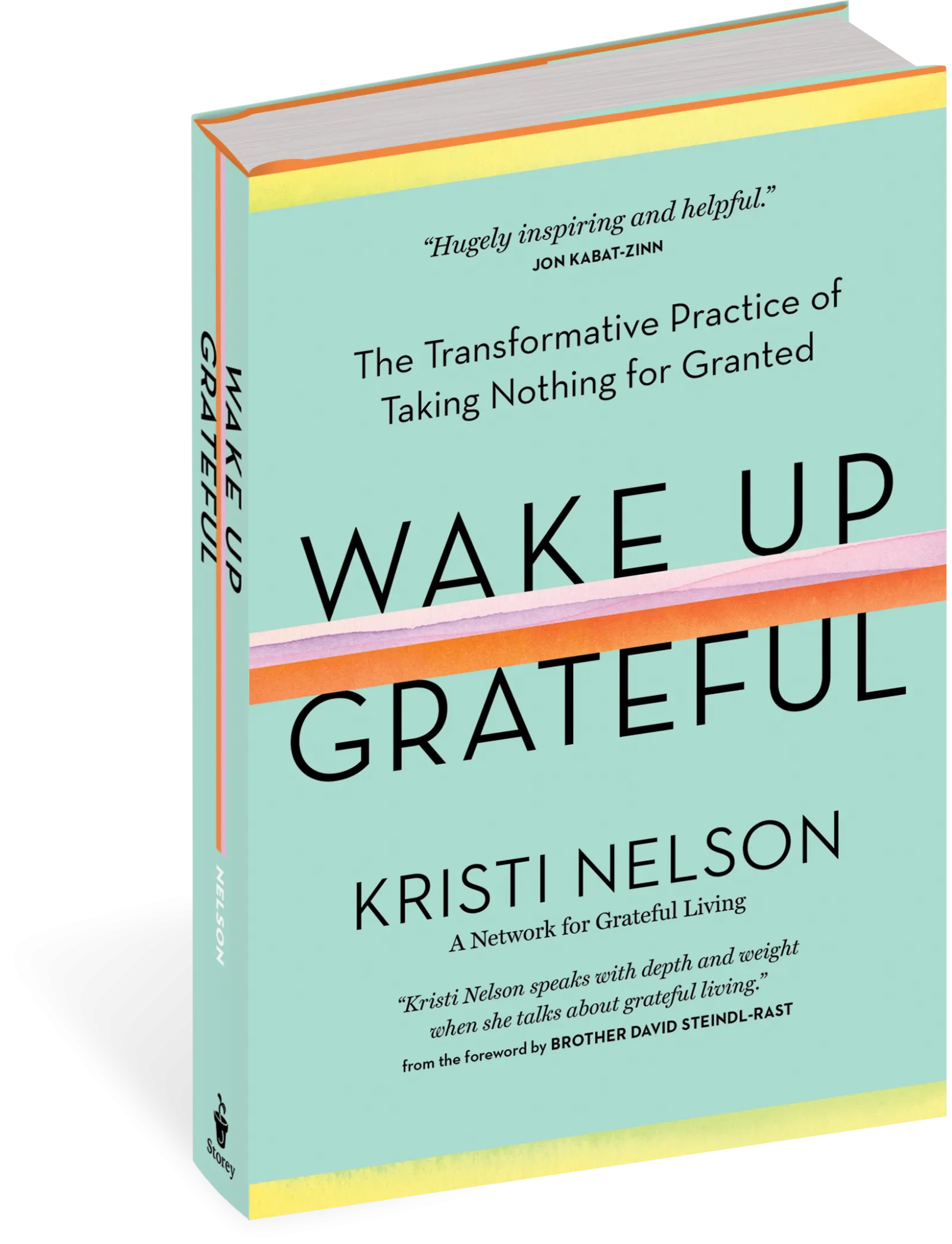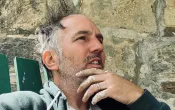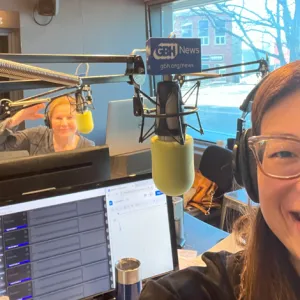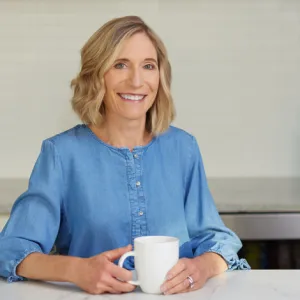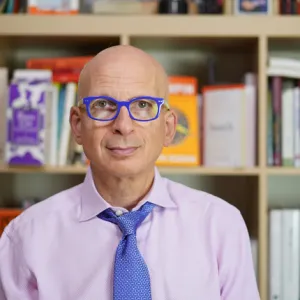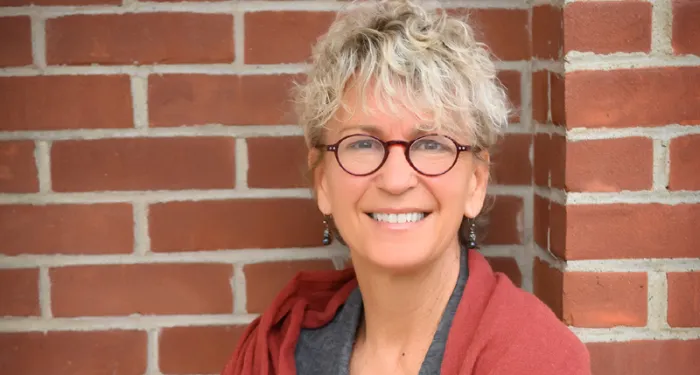
Kristi Nelson
The Miracle of The Glass
Must we face death to appreciate life? Survivor Kristi Nelson says there’s a better way. Learn how to reduce regret and live a life of authentic gratitude.
We know gratitude is a good thing. Studies show it improves your physical health, reduces negative emotions, increases mental resiliency, and lifts your mood. People often take aim at being more grateful for everyday things by reflecting on what they are thankful for or even writing a gratitude journal.
More often than not, people burn out and quit doing it — myself included. Just like we do with so many other well-intentioned changes in our lives, gratitude becomes an afterthought.
In this episode, we're going to hear from an expert at making gratitude central in her own life.
Kristi Nelson is Executive Director of the nonprofit organization A Network for Grateful Living. She's also the author of "Wake Up Grateful: The Transformative Practice of Taking Nothing for Granted."
And the wisdom she shares comes from hard-won experience. In this episode…
- You'll hear about Kristi's brush with death in her early 30s, and the terrible medical diagnosis she endured.
- She shares how the pain of her ordeal led her to new insights, and a truly deep appreciation for everything we experience in this life.
- And she'll share a new and completely different outlook on that age-old debate of optimism versus pessimism. The way she reframes the "half full or half empty" discussion is brilliant, and I'll never think about that question the same.
If you want to learn real-world techniques for feeling and living authentic gratitude, you'll want to hear this episode.
KRISTI NELSON: Thank you. At 32, I got really ill. I was an incredibly healthy person and I suddenly came down with fevers of unknown origin. That was the beginning of a very long journey, which ended in a stage four cancer diagnosis about nine months after I originally became ill. So it was a long period of time in hospitals. You don’t get let out when you have fevers of unknown origin, they like to keep you really close at hand, keep you monitored.
FRANK BLAKE: You never want to hear in a hospital “unknown, we don’t know.”
KRISTI NELSON: I think it’s the craziest diagnosis. Right? Though it is kind of a conclusive diagnosis. You’re diagnosed as this “unknown origin.” So it was a nine-month journey to diagnosis. By the time I was diagnosed as I said, I was stage four and the cancer had metastasized from my chest to my spine. So I was unable to walk. I was very, very ill and it’s always interesting because people think that it can be a very short, direct trajectory from the time you get sick until you get diagnosed.
And my experience was exactly the opposite and much more common than not that it can be very evasive and elusive and hard to diagnose…complicated. And so by the time I got diagnosed, I had had surgery to put rods in my spine and hold me upright again. And then I went through chemotherapy and radiation. So it was an 18-month journey altogether from the beginning to the end.
And I was 33 and a half when I came out of treatment. So when I say “not dying changed everything.” It is about the fact that every day that we don’t die, we’re given this opportunity. And I got woken up to that fact in a big way. So I had a poor prognosis after this, and it changed my whole life to all of a sudden get to be alive into the space where I was also reminded that life is precious and fleeting and to get to keep living.
And that reminder – the lessons of cancer combined with the opportunity to stay alive, to embody them and to live my life as fully as I possibly could in the short timeframe I had – was the most incredible gift in the world. And I really woke up to that. So that’s the journey not dying changed everything. And what I realize is every day that we don’t die is this amazing opportunity to be alive and to fulfill our heart’s desires and our intentions in the biggest ways. And yet we forget that so much of the time. So that was a gift for me.
FRANK BLAKE: Can I ask you, were you – or did you have to overcome – a sense of the massive unfairness of this happening to you? Were you railing against the universe at any point in this? I just feel like certainly I would, and maybe some of our other listeners would just be furious, just angry.
KRISTI NELSON: It’s not how I was orienting to the experience. And partly because I felt like: What if this day is my only day?
What if it’s really true that my life has shrunk to this and I don’t get a tomorrow. Am I going to spend it with my heart wide open, vulnerable, loving everybody I could love and every moment I had? Or was I going to spend it feeling like a victim and railing in some ways against the reality that was facing me.
I wanted each day to be the kind of possible last day that I could really live with. But that’s really being in touch with impermanence and recognizing life is precious and short. What am I going to do with it? I’m going to love as much as I can. And I’m going to see all the opportunities I can. And I don’t mean that in idealistic way, it’s not easy. It was work and it continues to be work, but it was worth it. It was worth it.
FRANK BLAKE: One might think that, okay, you’ve had this brush with death and that opens your eyes to the wonder of life and living every day fully. But, but for a lot of us or stories of when you have encounters like that, they wear off over time and then we’re back to steady state and we’re still letting the little irritants in life get to us and all of that. Did that happen to you? Did you have to work through that? Or how did you keep it from slipping away?
KRISTI NELSON: I didn’t, I fell prey to humanity, to being human, to that experience of losing perspective over and over again, Frank. That’s why this has become such an important practice to me, this whole idea of being grateful as a moment to moment practice. It’s why I wrote the book is because I realized I didn’t think I would ever lose touch with that incredible treasuring of life and every moment that I could be alive, I truly didn’t think I would lose touch with it because it was so real and vivid and acute when I first came out of treatment.
And then go figure six months later, a year later there I am and I’m saying, darn this traffic jam and darn this cold that I’m having in, oh I’ve gained 10 pounds and all the things that used to bother me before and had my attention, got my attention again.
And I realized, oh, this is more of a committed discipline to maintain that grateful awareness and to maintain that sense of life as precious, and to maintain that sense of it’s worth it to hold the perspective. It was a discipline and a huge awareness and wake up call for me, that perspective could slip so readily away unless we really work it.
FRANK BLAKE: So I love in your book that you compare being grateful to exercising a muscle, that it’s a muscle that you exercise. Is that part of the realization that this is something as like every other muscle, the more you use it, the stronger it gets? Tell us a little bit about that analogy.
KRISTI NELSON: You got it. You’re 100% on that. As one who has a variety of flaccid muscles, myself – all of us do with the things that we don’t use in life tend to atrophy – it’s so much about looking for the opportunities to flex that muscle, to strengthen that muscle in all the moments that we’re alive. And it serves us so deeply to create a practice. So that basically every moment is a practice moment.
Every moment we get the opportunity to re-up our commitment, right? So what else is a moment, but how do we want to show up into the moment? And so for me, being grateful is so much about continuing to flex the muscle. Remember it can be otherwise, use it, or you lose it. And I think that like mindfulness, people talk about mindfulness. If you want to really live mindfully, that’s an every moment experience and opportunity and commitment, same thing with gratefulness. If we want to live gratefully, it’s a moment-to-moment remembering over and over again about that commitment to ourselves and to life.
FRANK BLAKE: Let’s talk a bit about your book, Wake up Grateful. What led you to write the book at this time? Because it came out during the pandemic and I know how hard it is writing books. What was the path that led you to writing the book?
KRISTI NELSON: I wanted to share with people as much as possible, the pathways and the practices for how we can stay grateful in every moment of our lives.
We can’t be grateful for everything. That’s absolutely not what the book is talking about and it’s not what grateful living is. But we can be grateful in every moment when we work that muscle of perspective.
So I wanted to offer something to people because I know how hard it is. I’m a person who says “I lose perspective all the time,” so I can relate so deeply to the need to have guidance and guiding questions and guiding quotes and guiding practices that keep us on track. And for me, this whole idea of wake up calls – I think Crazy Good Turns, you’re talking about wake up calls all the time – well just what do we wake up to that then we turn into service?
So to me this was exciting to think about how can we live in an awakened state, live more awake so that we don’t need to have the wake up calls all the time. And I think being of service is a lot about helping people in that path. So that it’s not so painful and we don’t have to lose things over and over again in order to remember how precious they are that we can actually live in that awareness more fully in all the moments of our days.
FRANK BLAKE: So your book gives five guiding principles for grateful living?
KRISTI NELSON: Yeah.
FRANK BLAKE: And we’re not giving away any part of the book. And we’re going to recommend everybody buy your book. And we’ll give copies of your book away to our listeners, but what are your five guiding principles?
KRISTI NELSON: Well, thank you. And these are based on brother David Steindl-Rast’s teachings. He’s an extraordinary, Benedictine monk who founded the organization that I now run. I’m so blessed to run this organization. And the way that he sees life is also as a survivor. So just coming through the second world war and having the opportunity to be alive every day.
So I borrowed from his teachings and my own and came up with these five principles. And here they are, and there’s a lot. You can dive deep into any one of them.
The first one is: Life is a gift, greet each moment gratefully and you are always receiving. Always receiving that gift of life when you greet each moment gratefully.
The second one is: Everything is surprise. When you open to wonder opportunities abound. That’s a really big one.
The third one is: The ordinary is extraordinary. When you take nothing for granted, life is abundant.
The fourth one is: Appreciation is generative. When you tend what you value, what you value thrives.
And the fifth one is: Love is transformative. When you embrace the great fullness of life, your heart overflows.
FRANK BLAKE: As you say, each of those is so profound and we could spend a lot of time on each, but I just urge people to read your book. There are hundreds of good ideas and really interesting observations in your book – we are incapable of beginning to mine all the material in it. I will give our listeners one example that just made me sit upright and think, oh my gosh, I’ve heard this. I’m 72 years old. I’ve heard this since I could understand anything and no one ever challenged this framework. And it is your conversation around optimism and pessimism and the glass half full and the glass half empty. Would you just share with our listeners your observation on that?
KRISTI NELSON: Yes, I’d be happy to. So I think people who see life as a host of possibilities and opportunities are often called optimists or positive psychology, or also it’s now considered spiritual bypassing. That you’re not looking at the difficult things in life, and this is not true about living gratefully. Living gratefully actually looks squarely at the challenging things in life without being a pessimist, which is seeing everything that’s lacking and everything that’s missing and what isn’t there.
And that’s a big trap, right? But to me…the way to heal pessimism is not optimism. It’s to see that to have a glass at all is one of the most beautiful things in the world. We forget when we talk about “is it half full or half empty?” – we forget the miracle of a glass. If you didn’t have that, you’d have nothing.
FRANK BLAKE: That is so brilliant. That’s so brilliant.
KRISTI NELSON: Thank you.
FRANK BLAKE: And how can it be that for all of these ages, we’ve talked glass half full/half empty and no one said, well, you have a glass.
KRISTI NELSON: I appreciate that. I think that there’s another term and some people call it a possibilist. So there’s optimism, pessimism, and then seeing possibility. But to me, it’s also being a realist. It’s being really grounded in the fact that if you’re alive, that’s the greatest, most amazing thing of all. No matter what it’s full of, it’s like seeing that as the core truth to return to.
FRANK BLAKE: Right and as I say, your book is full of observations like that. And I just think it’s brilliant. I’m also a big fan of David Whyte and we were giving away copies of his book “Consolations” recently. And I love how you point out his quote, that being unappreciative might mean we’re simply not paying attention. What should we be paying more attention to in our lives?
KRISTI NELSON: The glass. I think the things that are extraordinary, which is everything. So I think we forget. Frank, we forget that the core essential things of life are so amazing that if we stay focused on those and offer our attention to those, that we can be just awestruck in all moments. For instance, the body, the fact of being alive and being right now able to be in conversation with you long distance, that our bodies are breathing, that I’m able to breathe without assistance, that I can listen to you and this is the most extraordinary thing the ways that our bodies work.
The ways that technology works, we can marvel constantly. And that’s not again about being in fairy dust. That’s about saying, oh my gosh, technology is enough to blow our minds every single day. How do we become numb to the things that 30 years ago, if we imagined them, we would have been so-
FRANK BLAKE: Extraordinary wonders.
KRISTI NELSON: It’s like the Jetsons, the old Jetsons cartoon, the things that are happening in our world right now. And then the other thing is the natural world. We can be in awe and have our minds blown by being paying deeper attention to so many things in our lives. And I think the natural world, the body, the gifts of civilization as we call them those things are always available to us to be in amazement. Like Mary Oliver says, “I want to be a bridegroom who is married to amazement, a bride married to amazement” that is the way to live our lives. And yet we forget until we remind ourselves.
FRANK BLAKE: So can we talk a little bit about the Network for Grateful Living, which you’re the executive director of. Tell our listeners about that.
KRISTI NELSON: We’re a global nonprofit organization. We last year served 1.2 million people coming to our website for practices, for guidance, for quotes, for inspiration. As I say, these are the things we need to fill our lives up with to remind ourselves what’s possible, right? To remind ourselves of the things that we want to remember in order to live the ways that we want to live. So we offer all of that for free on our website all the time. We have practices and courses, and we have e-cards and an online journal, and you can light a candle every day.
People come to our site and light candles every single day as a practice, as a way to be present and feel grateful for the people in their lives, who they’ve lost or who are present. So it’s a beautiful resource the website is, and then we also, before COVID we were doing workshops out in the world, and the book is part of it. So A Network for Grateful Living is a network of people who are committed to living gratefully, and they use our resources and our website – it’s at gratefulness.org – they use the resources on our website all the time, many of them, every single day.
FRANK BLAKE: How is practicing gratefulness different as a shared experience versus I just wake up in the morning and I journal about what I’m grateful about, how is it different as a shared experience?
KRISTI NELSON: It’s so beautiful actually, and both are important. I really think that having an individual practice that’s very private and deep is important, but it gets deeper when you’re with other people. When we listen to other people’s experience and how they work with the challenges in their lives, it’s so inspiring. And so people are there and they’re talking about what they’re struggling with and what they’ve overcome and how they’re practicing.
And it’s a constant source of support. And it’s an experience of belonging. It increases our sense of belonging, and that’s so valuable and people come 24/7 to the website to find that sense of connectedness and the resources. And we call it an online sanctuary. It’s actually an online sanctuary where you can practice. And we have people who have called us their lifeline that literally you come and you can, in those moments, gain the perspective that you’re looking for in any moment of any day. And it’s a real gift. It’s beautiful.
FRANK BLAKE: It’s such a brilliant idea. In your experience, how does gratefulness connect with generosity if it does?
KRISTI NELSON: It sure does. It’s core. I think here’s an interesting turn too. You might appreciate this and maybe you’re already familiar with this idea, but I had this insight a long time ago, which was, we think that gratitude is a response to generosity. “Oh, thank you so much for your generosity.” I think that feeling grateful is actually the origination of generosity.
It comes before generosity so that when we live in gratitude, we cannot help but be generous. And it’s so moving to say that I know it to be true in every cell of my body, that when we wake up to that preciousness of life, we want to share what we have our hearts open much more hugely to other people. It is a compassion generator, right? So that when we feel that experience, we are able to make do with less in our lives because we appreciate so fully what is ours.
FRANK BLAKE: That is just so, in my opinion, so accurate, so true. Do you see people coming to that realization as they share these experiences? Do you have some examples of that for people who connected with your network?
KRISTI NELSON: Yes. Over and over again. Actually we have people whose testimonials are so moving and some of them are mind blowing actually, so that they… People are really suffering a huge amount in their lives. But one of the things that I think opens up much more fully in the face of gratefulness is when we feel grateful, it’s easier to let go of resentments. I call it the great regret reducer. For me when I live gratefully, I’m much more conscious about not doing the things that I used to do that I would regret.
I’m living much more, my intentions, I’m living more awake, more conscious of what I’m doing. So for me, reducing those regrets and resentments is really valuable. And you see that over and over again, when people open up their heart to gratefulness, a lot of forgiveness, a lot of bridges built to other people in our lives when they’ve lost connection. We have pretty transformative stories of people making peace and making deep connections with people in their lives and also healing their own inner wellbeing; this place that is so enriched by feeling grateful, our sense of well being. And so lots of things transform in that space. And there’s lots of evidence and stories about that. Yeah. Thank you.
FRANK BLAKE: And what if any impact did the pandemic have on whether your network or what you observed around you? What are your observations on that?
KRISTI NELSON: That’s a great question. And of course, none of us had any idea what would happen. But what we saw was immediately, twice the number of people started coming to our website on a daily basis. It was a fairly immediate turnaround. And one of the reasons why is because the pandemic, if it taught us anything, and if it’s still teaching us anything, it’s to take nothing for granted.
FRANK BLAKE: Right.
KRISTI NELSON: What have we taken for granted that we don’t want to take for granted anymore? And that’s why this work of gratefulness is really about living in that state of taking nothing for granted. And so the more that we can live that way, the more fully we’re able to be present no matter the conditions of our lives. And that’s really the medicine for the pandemic, is to be able to live really fully into that. I think it’s what heals everything, because we never know what’s going to happen. Everything is surprise, but we can see the ordinary is extraordinary and we can take nothing for granted. And I think the pandemic has really brought that home very deeply to all of us.
FRANK BLAKE: So I ask this of every guest and you have so many extraordinary insights and you must have an extraordinary history. I ask every guest. Who is someone who’s done a crazy good turn for you? Who is it? What did that person do? Anything from small to large, whatever first crosses your mind.
KRISTI NELSON: There are so many, that’s a really hard answer. I think that’s the thing about life is to recognize just almost everybody who’s doing crazy good turns for me every single day. And so to answer your question, one person comes to mind and her name is Alex Elle. And she’s what’s called an influencer or a thought leader now. She’s a beautiful black woman who has healed a huge lifetime of trauma in her own life and has become this incredible writing-to-heal facilitator.
And she read my book at a time when the pandemic… There was no book tours or anything like this, my book came out a year ago when nobody was seeing anyone and Alex Elle read the book and talked about it on her podcast, posted it on Instagram, bought 15 copies for her mother and sister, and best friends, has been so generous in her praise around the book.
And I want to say, it just has meant the world to me. Because I think when we write something it’s incredibly meaningful to know that it has value and meaning to a whole diverse range of people. And that was such an affirmation and such a generosity on her part. And it has touched me deeply ever since, and we’ve become friends. And that was a really crazy good turn for me in the midst of having written a book, because writing a book is hard and publishing during a pandemic is really hard.
FRANK BLAKE: It can be really hard because this just… You lose those opportunities to connect with people in the bookstores and all the rest, everything is done virtually. So I can say that would be, that answering voice is a crazy good turn.
KRISTI NELSON: It’s a beautiful thing. Thank you so much. Yes. It was the feedback loop, which we have to often do without these days.
FRANK BLAKE: Yeah. So I think you’ve already answered this in some ways, but for listeners who, I mean, this is truly just a case of really the banquet of learning that you set out for folks. But if people want to know more about you, connect, what are the best ways in addition to reading your book?
KRISTI NELSON: Well, thank you. So grateful living, as we said, it’s really a way of life. It’s more than just finding one cause a day for gratitude. It’s really about living every moment gratefully. So our website is set up to do that. You come to gratefulness.org, it’s the support for living gratefully and there’s tons of resources on there. There’s courses you can take, there’s practices you can do, and I’m available there. And I love to be in conversation with people. So anytime anybody wants to talk, I love saying yes.
So it’s such a joy and thank you for inviting me. And more of these kinds of conversations are only going to enrich people’s lives. So I think figuring out how to share this conversation is an important thing. This podcast that you’re doing – which is so brilliant – and spread the generosity through the world, through something that moves you, let it move other people as well.
FRANK BLAKE: So I’ve got one final question. I wasn’t planning to ask this question, but this has been such an interesting conversation and you are clearly such a thoughtful, generous person. I’m sure there were lots of things tugging on your heart and mind and what you would be doing. What was the path actually to where you are now? Was that a tough decision for you to take this on? Or was it very natural? And it was, oh yes, this is what I’m here to do is to run this organization.
KRISTI NELSON: This is what I was here to do. And I knew it because if I could spend one day being of service and changing how people live their lives, as a result of my difficult experience and learning to live gratefully and with perspective, it would be worth it. And so the fact that I’ve been in this position now with this organization for almost eight years, it’s just been eight years of privilege, honestly.
And so I think when we connect that place where wake up calls result in an awakening, and then we’re given the opportunity to do something with it – that’s the definition of joy and purpose, and I think an embodied love for life. So that’s why I feel great fortune in this position.
FRANK BLAKE: Wow. Well, it has been just a privilege having you on Crazy Good Turns, Kristi, you’ve done a crazy good turn for all of us by appearing on the show.
KRISTI NELSON: Thank you so much for having me.
In the last few episodes we've asked our listeners to share stories of people who, by their acts or their example, give generously. I want to thank everyone who has reached out via email and social media to tell us about the good things going on around them. One of those submissions connects with this month's episode and Kristi's story.
Listener Sherri Johnson told us: "My husband, Jimmy Johnson, is a two-time cancer survivor and is in remission. I am grateful to have another year with him. His indomitable will and zest for life keep me amazed."
Sometimes, watching people go through something incredibly difficult and witnessing their strength provides an example that we're thankful to have. This kind of grateful living is contagious; seeing someone celebrate every extra day reminds us not to take our own days for granted.
We send our thanks to Sherri for sharing this personal reflection, and our congratulations to Jimmy on his continued health. It's your turn to tell us about anyone who is setting an example of Crazy Good Turns for us all to follow.
Send them to me on Twitter, or email them to our team at hello@crazygoodturns.org. We'll share your stories in a future episode of Crazy Good Turns.
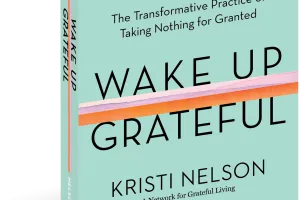
Win Kristi’s Book for FREE
Win Kristi’s Book for FREE
